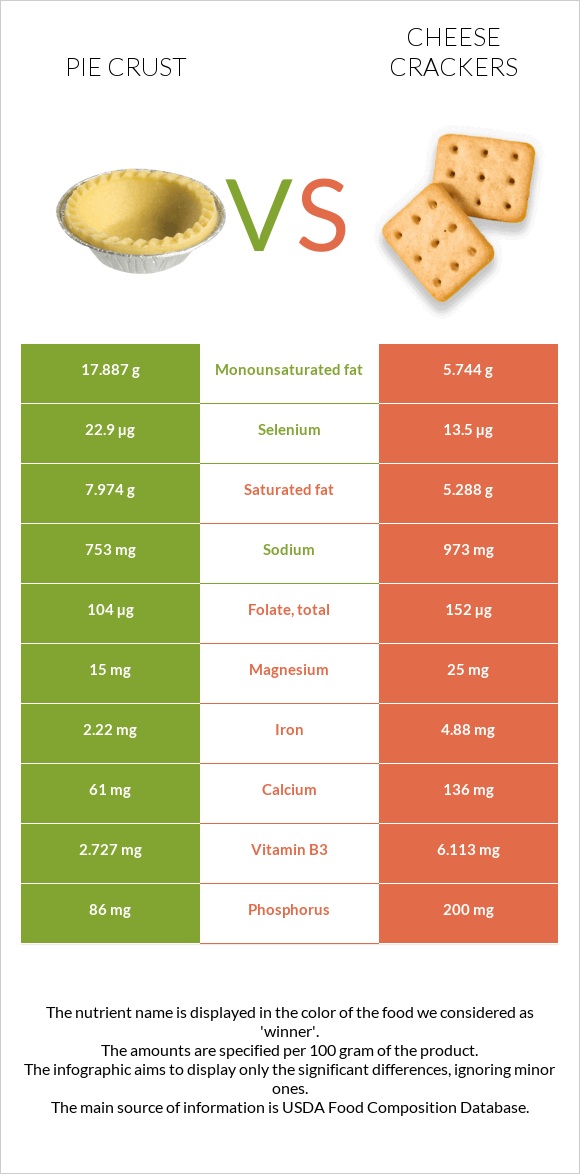Pie crust vs. Cheese crackers — In-Depth Nutrition Comparison
Compare
What are the main differences between pie crust and cheese crackers?
- Pie crust is richer in selenium, yet cheese crackers are richer in iron, vitamin B3, phosphorus, vitamin B12, vitamin B1, folate, manganese, and vitamin B2.
- Cheese crackers' daily need coverage for iron is 33% higher.
- Pie crust has 2 times more selenium than cheese crackers. Pie crust has 22.9µg of selenium, while cheese crackers have 13.5µg.
- Cheese crackers contain less saturated fat.
We used Pie crust, standard-type, dry mix and Crackers, cheese, regular types in this comparison.
Infographic

Infographic link
Mineral Comparison
Mineral comparison score is based on the number of minerals by which one or the other food is richer. The "coverage" charts below show how much of the daily needs can be covered by 300 grams of the food.
| Contains less SodiumSodium | -22.6% |
| Contains more SeleniumSelenium | +69.6% |
| Contains more MagnesiumMagnesium | +66.7% |
| Contains more CalciumCalcium | +123% |
| Contains more PotassiumPotassium | +143.8% |
| Contains more IronIron | +119.8% |
| Contains more CopperCopper | +66.7% |
| Contains more ZincZinc | +197.5% |
| Contains more PhosphorusPhosphorus | +132.6% |
| Contains more ManganeseManganese | +78.4% |
Vitamin Comparison
Vitamin comparison score is based on the number of vitamins by which one or the other food is richer. The "coverage" charts below show how much of the daily needs can be covered by 300 grams of the food.
| Contains more Vitamin AVitamin A | +∞% |
| Contains more Vitamin B1Vitamin B1 | +43.4% |
| Contains more Vitamin B2Vitamin B2 | +58.7% |
| Contains more Vitamin B3Vitamin B3 | +124.2% |
| Contains more Vitamin B5Vitamin B5 | +76.1% |
| Contains more Vitamin B6Vitamin B6 | +165.6% |
| Contains more Vitamin B12Vitamin B12 | +∞% |
| Contains more FolateFolate | +46.2% |
All nutrients comparison - raw data values
| Nutrient |  |
 |
DV% diff. |
| Polyunsaturated fat | 3.968g | 10.09g | 41% |
| Iron | 2.22mg | 4.88mg | 33% |
| Monounsaturated fat | 17.887g | 5.744g | 30% |
| Starch | 52.56g | 22% | |
| Vitamin B3 | 2.727mg | 6.113mg | 21% |
| Selenium | 22.9µg | 13.5µg | 17% |
| Phosphorus | 86mg | 200mg | 16% |
| Vitamin E | 2.19mg | 15% | |
| Vitamin B1 | 0.392mg | 0.562mg | 14% |
| Vitamin B12 | 0µg | 0.34µg | 14% |
| Fats | 31.4g | 22.74g | 13% |
| Folate | 104µg | 152µg | 12% |
| Saturated fat | 7.974g | 5.288g | 12% |
| Manganese | 0.315mg | 0.562mg | 11% |
| Sodium | 753mg | 973mg | 10% |
| Vitamin B2 | 0.213mg | 0.338mg | 10% |
| Fiber | 2.3g | 9% | |
| Protein | 6.9g | 10.93g | 8% |
| Calcium | 61mg | 136mg | 8% |
| Vitamin B6 | 0.064mg | 0.17mg | 8% |
| Vitamin K | 9.4µg | 8% | |
| Zinc | 0.4mg | 1.19mg | 7% |
| Copper | 0.075mg | 0.125mg | 6% |
| Vitamin B5 | 0.268mg | 0.472mg | 4% |
| Potassium | 64mg | 156mg | 3% |
| Carbs | 52.1g | 59.42g | 2% |
| Magnesium | 15mg | 25mg | 2% |
| Vitamin A | 0µg | 17µg | 2% |
| Choline | 8.7mg | 2% | |
| Calories | 518kcal | 489kcal | 1% |
| Cholesterol | 0mg | 3mg | 1% |
| Net carbs | 52.1g | 57.12g | N/A |
| Vitamin D | 1 IU | 0% | |
| Sugar | 4.53g | N/A | |
| Trans fat | 0.542g | N/A | |
| Tryptophan | 0.08mg | 0.129mg | 0% |
| Threonine | 0.184mg | 0.295mg | 0% |
| Isoleucine | 0.255mg | 0.424mg | 0% |
| Leucine | 0.476mg | 0.744mg | 0% |
| Lysine | 0.133mg | 0.418mg | 0% |
| Methionine | 0.121mg | 0.194mg | 0% |
| Phenylalanine | 0.339mg | 0.49mg | 0% |
| Valine | 0.289mg | 0.478mg | 0% |
| Histidine | 0.146mg | 0.245mg | 0% |
| Fructose | 0.37g | 0% | |
| Omega-3 - EPA | 0g | 0.001g | N/A |
| Omega-3 - ALA | 0.715g | N/A | |
| Omega-3 - DPA | 0g | 0.001g | N/A |
| Omega-6 - Dihomo-gamma-linoleic acid | 0.001g | N/A | |
| Omega-6 - Eicosadienoic acid | 0.007g | N/A | |
| Omega-6 - Linoleic acid | 9.25g | N/A |
Macronutrient Comparison
Macronutrient breakdown side-by-side comparison
Protein:
6.9 g
Fats:
31.4 g
Carbs:
52.1 g
Water:
7.6 g
Other:
2 g
Protein:
10.93 g
Fats:
22.74 g
Carbs:
59.42 g
Water:
3.55 g
Other:
3.36 g
| Contains more FatsFats | +38.1% |
| Contains more WaterWater | +114.1% |
| Contains more ProteinProtein | +58.4% |
| Contains more CarbsCarbs | +14% |
| Contains more OtherOther | +68% |
Fat Type Comparison
Fat type breakdown side-by-side comparison
Saturated fat:
Sat. Fat
7.974 g
Monounsaturated fat:
Mono. Fat
17.887 g
Polyunsaturated fat:
Poly. Fat
3.968 g
Saturated fat:
Sat. Fat
5.288 g
Monounsaturated fat:
Mono. Fat
5.744 g
Polyunsaturated fat:
Poly. Fat
10.09 g
| Contains more Mono. FatMonounsaturated fat | +211.4% |
| Contains less Sat. FatSaturated fat | -33.7% |
| Contains more Poly. FatPolyunsaturated fat | +154.3% |





